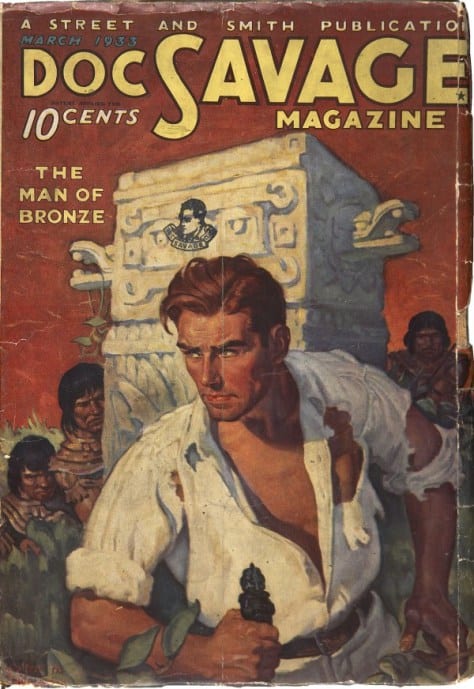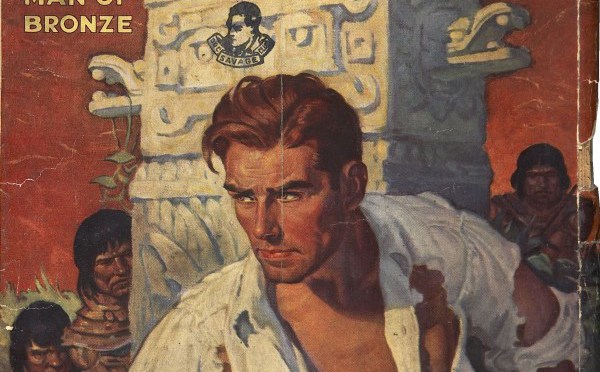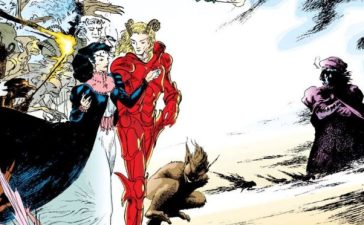
Doc Savage debuted in the first issue of Doc Savage Magazine (March 1933), and the pulp magazine character had a huge influence on the comic book superhero genre. Raised by scientists hired by his father, the young Doc Savage undergoes an exercise regimen that allows him to reach the zenith of mental and physical perfection. As an adult, Doc Savage uses his keen scientific mind and great strength to help humanity.
Written primarily by author Lester Dent (under the pseudonym Kenneth Robeson), Doc Savage’s original pulp magazine adventures endured until 1949, and inspired radio and comic book adaptations, and even a movie. The character was often referred to as a “superman” in the pulp stories, and undoubtedly influenced the creation of the first comic book superhero, Superman, who debuted in 1938. Both characters are strong and smart, use their abilities to help the less fortunate, and even share the same first name – Doc Savage’s full name is Clark Savage, Jr., while Superman’s alter ego is Clark Kent.
But the idea of training the mind and body from an early age to become a superhero is also present in the secret origin of another early superhero character – Batman. After young Bruce Wayne’s parents are murdered, he trains to become a master detective, scientist, and pugilist in order to fight crime as Batman. Although Batman fans must speculate about what regimen Bruce used to achieve his skills as a superhero, Doc Savage fans were given insight into the regimen that turned Clark Savage, Jr. into a superman.
Beginning in 1935, Doc Savage Magazine printed some of the physical and mental exercises used by Doc Savage to hone his mind and body, the so-called “Doc Savage Method of Self-Development”. For example, Exercise I, printed in the July 1935 issue, provides a relaxation technique :
Doc Savage, in his adventurous career, undergoes terrific mental and physical strain, and because of such, operates on a highly keyed nervous tension. But he has learned the secret of recovery from these stresses of the body: relaxation. As complete relaxation and sleep are nearly the same, striving for one is attainment of the other.
Relaxation is impossible so long as any one or series of muscles are tense or in play. Doc, knowing this, lies flat on his back, or, if in bed, takes a position conducive to sleep and clears his mind of all conflicting thoughts. He then attempts to visualize a black space in his mind, creating mental pictures of the inside of a subterranean dungeon cell at midnight on a cloudy night. In other words, a complete blackness.
While this blackness is building up, Doc mentally commands the muscles in his body from ankles down to become completely limp. Then continues to the knee, making sure the calf muscles are absolutely “soft.” From here he attempts to relax the muscles of hips, and the upper torso. All the while he is continually picturing in his mind’s eye the absolute blackness.
Most times Doc falls asleep long before calling on all his body muscles to relax, for the blackness has taken effect.
Exercise XXVI, printed in the November 1935 issue, provides an exercise to make a person a better lip reader:
Upon his ability to read lips Doc Savage has many times relied to discover treachery and the future plans of his antagonists.
This, of course, is an accomplishment that required long and hard practice. Doc started by memorizing the “Declaration of Independence,” including the names of the signers and the places they represented at the signing of that historic document.
Then he placed himself before a mirror and, closely watching his own lips, he repeated the Declaration until he could recognize on the lips of a person talking out of his range of hearing any of the words in that exercise. Doc then changed to other documents, speeches or poems.
The reason he selected well-known speeches, poems or documents was because every word and its meaning was exact. By enunciating clearly he could tell, as each day went by, the exact lip action necessary for each word.
Of course, will power is as important to a superman as any physical skill, thus Exercise XLIII, printed in the January 1936 issue:
While not an exercise, it is well to point out that Doc Savage conquers his problems by will power, as well as by his marvelously developed muscles and senses.
Never has Doc allowed himself to think even of giving up or allowing a problem to conquer him. He has developed a will power that does not know the meaning of defeat. When he is in trouble, or dangers threaten, Doc Savage goes straight ahead and when everything seems lost he calls on that extra power of will that forces him through to victory.
He developed his will power by thinking assertive thoughts. He says “I will” and “I can,” rather than “I’ll try” or “I hope I can.”
Many times he has faced defeat and death; but each time, Doc asserts himself. “I will do this thing because I know it is right,” he says, and goes ahead and completes it.
Doc never wastes his mental effort in worry. He realizes such is futile and foolhardy. He makes his plans according to the many facts his marvelously developed brain has given him, and proceeds to make his plan win. He knows he is in the right, and that right will win.
You can find an extensive listing of all these exercises at the excellent Doc Savage fan website, The 86th Floor, in case you would like to train yourself to be superhuman.
The images above are the property of their respective owner(s), and are presented for educational purposes only under the fair use doctrine of the copyright laws of the United States of America.
The pulp covers above can be found at the website Pulpcovers.com.









